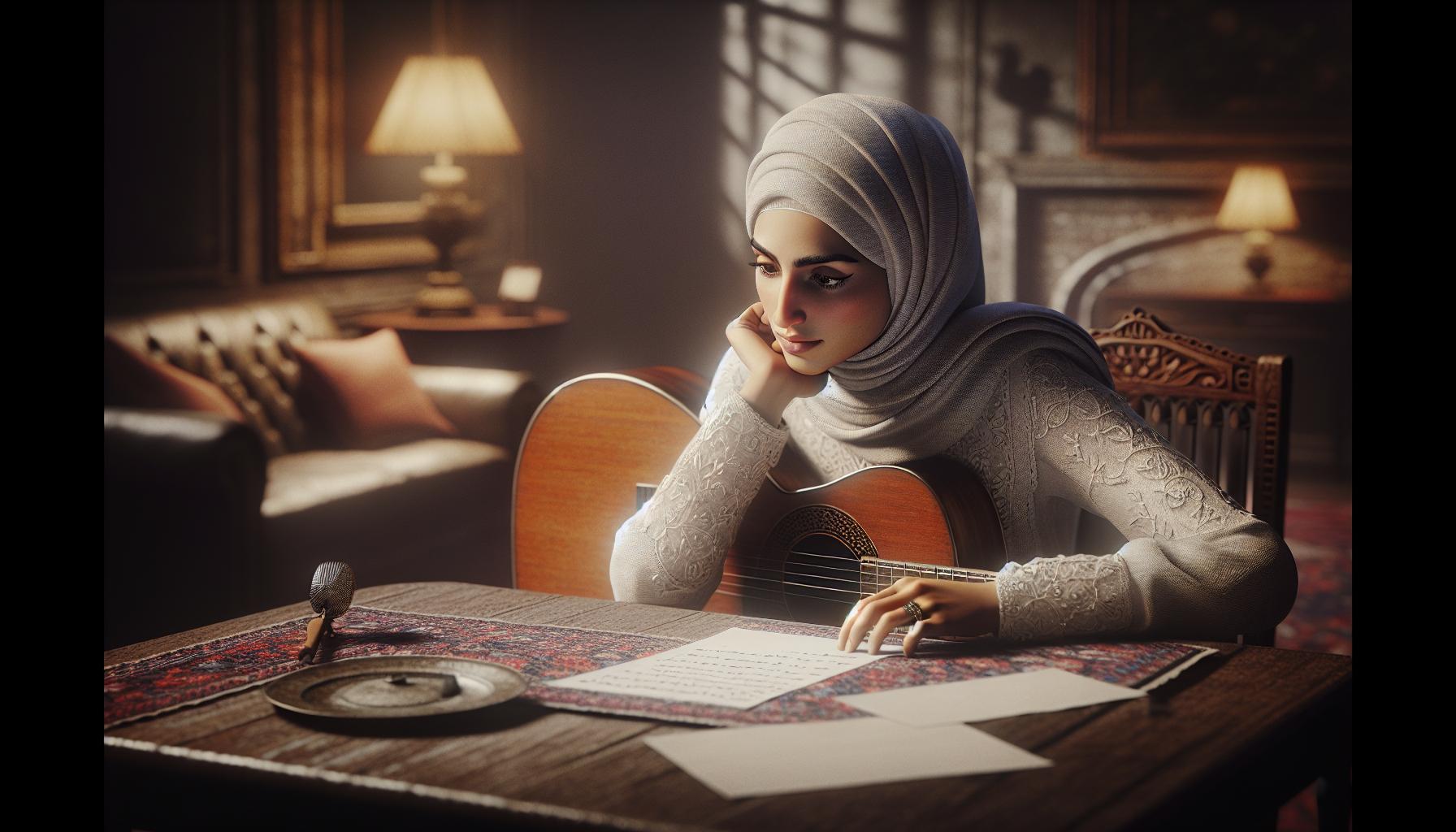As a songwriter, I’ve often found myself staring at a blank page, waiting for inspiration to strike. It’s a common struggle for many of us in the songwriting world. But what if I told you that inspiration is everywhere, and it’s all about knowing where to look?
The power of a song lies in its ability to evoke emotions, tell a story, and connect with listeners on a deep level. But crafting such a song can be challenging, especially when you’re feeling uninspired. Over the years, I’ve discovered some effective ways to find inspiration for songwriting, and I’m excited to share them with you.
Whether you’re a seasoned songwriter or just starting out, finding inspiration can sometimes feel like searching for a needle in a haystack. But don’t worry, I’m here to help guide you through the process. Let’s dive into the world of songwriting and discover the secrets to finding your muse.
Contents
Exploring the Power of Songs
Before plunging headfirst into the world of songwriting, it’s essential to understand the power that a song holds. Why? Because knowing this not only motivates you but also clarifies what you should aim for in your writing endeavors.
Ever noticed how a certain song can make your heart flutter or stir up a storm of emotions within you? Well, that’s what I call the ‘magic of music’. And it’s this magic that a songwriter needs to capture.
The power of a song is multifaceted. It has the ability to evoke emotions, summon past memories, establish a connection between the singer and the listener, and yes, sometimes it may even have the power to change our perception of the world. No other form of art can affect an individual to such an extent.
Let’s delve a little deeper into these dimensions.
Songs and Emotions: It’s often said that music is the language of emotion. Whether it’s joy, sorrow, anger, or love, a well-crafted song can vividly portray all. Each beat, each note and each word can hit the listener in a way that mere spoken words never could.
Reliving Memories Through Songs: Next time you hear a favorite childhood tune, pay attention to the memories it brings. It’s mesmerizing, isn’t it? How a simple melody can instantly transport you back in time? That’s another power of a song – it serves as a time machine.
Connecting Through Songs: The beauty of a song lies in its ability to form connections. When you write a song pouring your heart out, it resonates with people who are experiencing the same feelings or going through similar situations. It’s a silent bond, a mutual understanding formed through the chords and lyrics of a song.
But how can you make your songs powerful enough to evoke emotions and connect with the audience? Where can you find the endless source of inspiration to make each of your songs unique and impactful? Let’s explore that in the next section.
The Struggle of Finding Inspiration

Dipping the quill of your thoughts into the inkpot of inspiration isn’t always as simple as it sounds. Let’s face it: all writers know the daunting shadow of the feared “writer’s block”. It’s real, it’s frustrating, and it’s quite often a songwriter’s most unwelcome visitor. Yet, there’s often an unseen opportunity cloaked within this struggle.
Empty pages and sugarless coffee may come to define your nights when the muse chooses to hide. When words refuse to comply, and melodies within your mind become silent whispers, it’s important to remember: these are the nights that shape you as a songwriter, the nights when you evolve.
Facing the Blank Canvas
The blank page is like a canvas and inspiration, the palette of colors. It’s critical to remember that the canvas isn’t your enemy — it’s the landscape of your future masterpiece. You may struggle to paint the first stroke, the opening line of your song. But don’t worry, this struggle isn’t a sign that you’ve lost your touch. Rather, it’s your mind’s way of challenging you to dig deeper, push harder, and conjure a melody from the whispers within.
Embracing the Struggle
Don’t shy away from the struggle. Embrace it, for it is growth. Empty pages are nothing but uncharted territories, waiting for you to map out your thoughts. Your frustration is the testimony of your passion, the fire that fuels your will. Remember, it’s the artist’s struggle that transforms the strokes into a painting, the notes into a song.
We’ll soon delve into a few proven techniques designed to help you outsmart the dreaded “writer’s block”. Stay tuned for proven methods to aid the extraction of muses from their hiding places and pour words onto your once empty canvas.
Unlocking Inspiration: Where to Look
Every songwriter experiences that frustrating moment when inspiration seems to be hiding. But remember, it’s never lost. It’s just hiding in plain sight and nudging you to seek it out.
Bearing this in mind can help you in cultivating an explorative mindset, which is one of the most transformative aspects of maximizing your songwriting productivity. The question then becomes, where should we look?
Diving Deep into Emotions
There’s a goldmine of inspiration within our emotions. They’re an endless source of creativity that can invoke strip-back raw feelings or moments of euphoria. Joy, sorrow, anger, surprise, love, explore these emotions and stake claim on your unique perspectives.
Incorporating Life Experiences
Life experience is another abundant wellspring of inspiration. These could be personal events or circumstances observed around you. Look for stories in ordinary moments. Rich narratives are born from simple, everyday situations.
Surrounding Nature
Don’t underestimate the power of a good walk in the greenery or just sitting by a flowing river. Nature has a way of calming the mind, letting it wander, and, more importantly, throwing open the doors of imagination.
How about some practical ways to start those creative engines?
- Morning Pages: Start your day scribbling thoughts in a notepad, without any judgment or restriction. It frees up your unfiltered subconscious.
- Song Prompts: Use song prompts. They’re straightforward techniques to tackle the infamous writer’s block.
- Creativity Rituals: Establish your creativity rituals. Whether it’s early morning meditation or a late-night cup of tea, find a routine that sparks your creativity.
Remember, there’s never a lack of inspiration, just variance in our perspective. With an open mindset, you make room to welcome inspiration in all its forms. So, in our following sections, let’s dive into how these sources can be harnessed for captivating songwriting.
Tapping into Emotions and Stories
Emotions are the driving force behind many popular songs. It’s essential for songwriters like myself to tap into them during the creative process. This is not as daunting as it initially sounds. You can translate your feelings into lyrics by identifying an emotion, giving it a dimension, and portraying it in a relatable way.
Consider this scenario: You’re heartbroken. There’s a whirl of emotions you may be experiencing here -loss, sadness, regret, longing. Those can be used to draft impactful words for your song. Now give it a dimension. What was your heartbreak like? Was it peaceful, filled with acceptance? Or full of turbulence and anger? By answering these questions, your lyrics become more relatable as they evoke familiar sentiments in your audience.
Remember, authenticity is key. No one knows your feelings better than you do. Convey them unfiltered and your audience will appreciate the honesty. This raw emotion in your songs can create a connection with your audience on a deeper level.
When you’ve mastered the art of expressing feelings, it’s time to weave stories into your songs. These stories can be from your personal experiences or inspired by the experiences of those around you. By doing so, you’ll foster a connection with your audience as they find bits of their life in your songs. I’ve found it helpful to keep a journal where I can note memorable incidents or spark ideas. Later these snippets can be woven into a song to create a narrative arc.
Here are quick cadences to start your lyric-writing journey:
- Embrace your emotions. Identify them, reflect on them and transcribe them into lyrics.
- Create Dimension. What was the texture of your emotion? Add these details to give depth to your lyrics.
- Weave Stories. Pull from personal experiences. Challenge yourself to infuse even the most mundane incidents into songs with creative storytelling.
- Maintain a Journal. To capture fleeting thoughts or experiences as they come, keep them for future retrieval.
Emotion-driven songs and stories provide a strong foundation for songwriting. The nuanced feelings and experiences you offer through your lyrics can make a simple song extraordinary. Harnessing these elements can help you develop a unique voice and offer an emotional journey your audience can connect with.
Secrets to Finding Your Muse

Experienced songwriters often have a ‘go-to’ source for finding their muse. This wellspring of inspiration can vary greatly from one artist to another but there are a few universal methods that can and have sparked countless hit songs.
The natural world is one such resource. Observing nature’s rhythms, its quiet resilience, chaotic beauty or powerful displays can catalyze profound lyrical composition. Nature also offers a backdrop for solitude and introspection, instrumental in nurturing creative thought. I can’t count the number of times I’ve found myself scribbling verses on a park bench or in the still silence of a forest hike.
Conversations with others enlighten us about varying world views, experiences and emotions. They can provide valuable insight that can be placed into a song. A seemingly mundane chat at a bus stop or a deep heart-to-heart with a close friend – moments like these are gold mines for an attuned songwriter.
Another secret to finding your muse lies in embracing change and new experiences. Trying out different cuisines, exploring unfamiliar locales, or even adopting a new hobby can shake up your routine and spark the creativity you’re seeking. Remember that inspiration often breeds creativity and trying something new is one of the quickest ways to generate fresh inspiration.
The media is also a potential wellspring of motivation. Movies, books, podcasts, and news stories evoke powerful emotions and can serve as a catalyst for songwriting. I’ve often found myself moved to write after a particularly emotive film or a dramatic news report.
Lastly, cultivating your creative discipline is key. Insist on dedicating a set amount of time each day to writing, even when you feel completely uninspired. These periods of dedicated time often become more fertile the more regularly they are observed because discipline fosters creativity.
In essence, finding your muse involves seeking and maintaining an awareness of the world around you, diving headfirst into new experiences, cultivating a healthy creative discipline, and tapping into the multitude of stories and emotions you encounter each day.
Conclusion
So there you have it. Finding inspiration for songwriting isn’t a one-size-fits-all process. It’s about discovering your unique source of creativity. It might be nature, engaging conversations, or embracing new experiences. It’s also crucial to keep your creative discipline sharp and stay tuned into the world around you. Remember, every day brings a wealth of stories and emotions to tap into. So get out there and find your muse. Your next hit song could be just around the corner.
